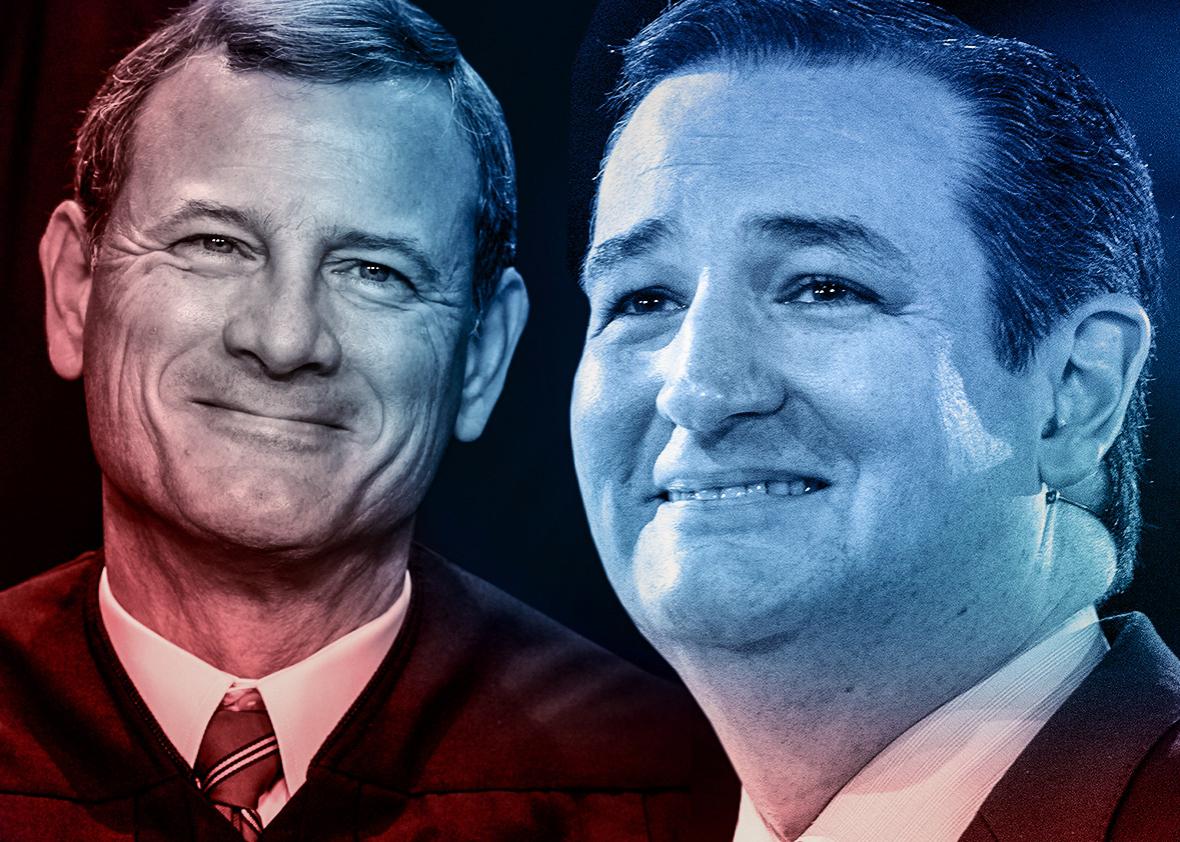It’s quite something that Republican presidential candidates have decided Supreme Court Chief Justice John Roberts is a liberal traitor to the cause. CNN moderators devoted a healthy segment to this discussion in Wednesday night’s debate, one that largely took place between Jeb Bush, whose brother appointed Roberts, and Sen. Ted Cruz, a well-pedigreed conservative lawyer himself.
Cruz, who has called for Supreme Court judicial retention elections to eliminate constitutional heretics like Roberts, declared that it was a “mistake” for President George W. Bush to appoint Roberts to the court in light of his two decisions to uphold the Affordable Care Act. “He’s a good enough lawyer,” Cruz said, “that he knows in these Obamacare cases he changed the statute, he changed the law in order to force that failed law on millions of Americans for a political outcome.” Cruz claimed that had he been president in 2005, he would have appointed a more “rock-ribbed” conservative judge. That judge would have promised President Cruz that in seven years, he would absolutely strike down a health care law nicknamed after the then-junior senator from Illinois.
Bush, while ably forcing Cruz to confess that he supported Roberts’ confirmation in 2005, recognized in their exchange that a full-throated defense of Roberts’ selection was not politically wise. “Going forward,” he said, “what we need to do is to have someone that has a long-standing set of rulings that consistently makes it clear that he is focused exclusively on upholding the Constitution of the United States so they won’t try to use the bench as a means to which legislate.” No more appointments for judges like Roberts, whose modest two-year service on a federal appeals court should have been the first clue that he would eventually certify the legality of a market-based health reform law.
Cruz equated Roberts with “philosopher-kings imposing their liberal policies on millions of Americans.” Again, this is a somewhat hyperbolic depiction of Roberts’ record. Aside from his Obamacare decisions—both of which were in fairly brittle cases brought by conservative plaintiffs—Roberts’ has been a stalwart conservative. And Obamacare will be a thing of the past, anyway, when Cruz becomes president.
If Cruz does become president, by the way? The individual to whom he’d owe that victory, more than any other, would be Chief Justice Roberts. It was the Roberts court, in Citizens United v. FEC, that paved the way for the super PAC era that would allow a figure like Cruz to prevail.
And yes, Cruz certainly has a path to the nomination. Let’s say there are three ways that the GOP primary process plays out from here The first is an extension of the current paradigm in which nonpolitician outsiders Donald Trump and Ben Carson command between them the majority of support of Republican voters. If this doesn’t change, either Trump or Carson will win the nomination. The second is one in which the “old rules” of Republican Party nominating reassert themselves: A majority flocks to the establishment candidate with party backing and vast resources. (This would require the establishment to corral around a candidate first—either Bush or Sen. Marco Rubio—but that’s a whole other mess.) Then there’s the third reality: The vast anti-establishment parcel that Trump has excavated remains, but those voters migrate to a somewhat more credentialed, conventional candidate. That would be Cruz. This is the scenario on which he’s been banking all summer.
In this world, Trump and Carson would falter and Cruz would take the Iowa caucuses, we’re he’s well-positioned, and ride that momentum to a solid showing in New Hampshire. Under the old rules, this is where the party establishment would put its foot down: It would marshal its resources behind a Bush or a Rubio, cut off the insurgent in South Carolina and Florida, and finish him on Super Tuesday.
But those rules no longer apply, since the party no longer has the party fundraising market cornered. That’s because of Citizens United.
Super PACs supporting Cruz have already raised at least $38 million. Throw in the not-bad $14 million that Cruz’s official campaign raised in hard cash through June, and he already has a sizable war chest—nothing quite like Bush’s nine-figure haul, but certainly enough to carry him to the end of primary season.
If Cruz is able to pull this off, he should at the very least stop calling Roberts mean names like Liberal Philosopher-King. Really, if he wants to be a peach, he should send Roberts (and that other filthy liberal monster, Anthony Kennedy) a bouquet of freshly cut flowers or a generous iTunes gift card. In Citizens United and subsequent campaign finance opinions that Roberts himself wrote, his court has established a very narrow test for determining the corrupting influence of money in politics, one that allows Cruz to accept multimillion-dollar checks from a handful of billionaires that could take him to the promised land. And all Cruz can do is call him names! Aren’t gentlemen of Harvard supposed to learn manners at some point?
